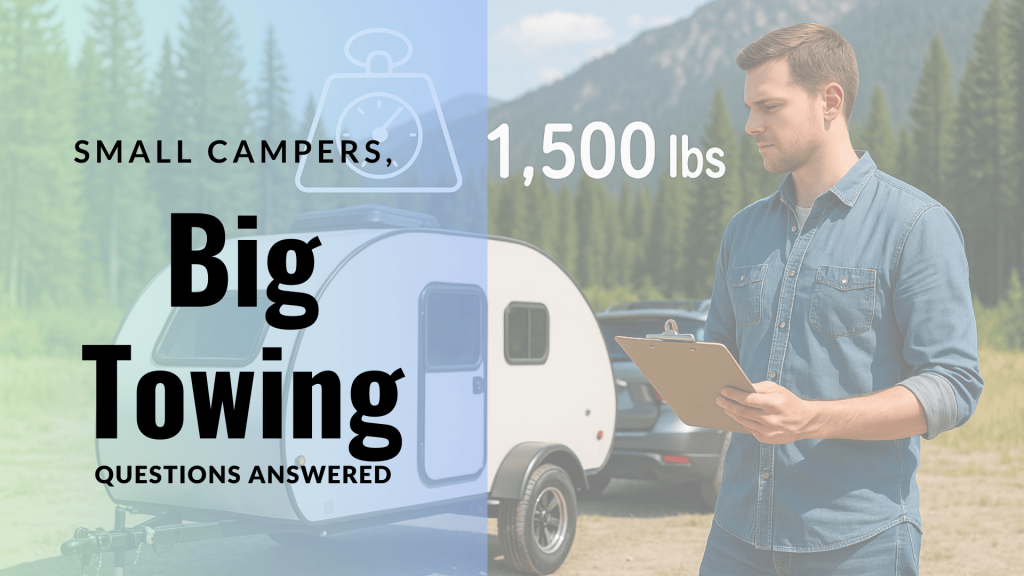Curious about small camper weights before hitching up for your next adventure? Small campers offer freedom without the bulk, but their weight impacts everything from which vehicle can tow them to how much fuel you’ll burn on the road.
Most small campers weigh between 1,200-4,500 pounds empty, but that number climbs once you add water, gear, and those “just in case” items everyone packs.
The right match between your tow vehicle and camper creates safer travels and happier adventures. Too heavy, and you risk transmission issues and dangerous road handling.
Too light might mean sacrificing features you’ll wish you had at the campsite. Let’s break down what these nimble homes-on-wheels actually weigh and why those numbers matter for your camping future.
Understanding the Weight of a Small Camper
Knowing how much your small camper weighs is crucial when planning your road trips. Small campers typically range from 1,200 to 4,500 pounds when empty (known as “dry weight”).
This figure matters greatly when matching your towing vehicle to your camper. For many outdoor enthusiasts, small campers offer the perfect balance between comfort and mobility.
They provide shelter and basic amenities without requiring massive trucks or specialized driving skills. However, understanding weight considerations is essential before making any purchase.
Types of Small Campers and Their Weights
Let’s look at common small campers and what they typically weigh:
| CAMPER TYPE | TYPICAL DRY WEIGHT RANGE |
|---|---|
| Pop-up | 1,200-2,500 pounds |
| Teardrop | 1,000-3,000 pounds |
| A-frame | 1,800-3,500 pounds |
| Small Travel Trailer | 2,800-4,500 pounds |
The size and materials used in construction play a big role in these numbers. Aluminum-framed models tend to be lighter than those with wooden frames.
Why Weight Matters
Your vehicle’s towing capacity should exceed your camper’s fully loaded weight. Here’s why this matters:
- Safety on the road depends on staying within your vehicle’s limits
- Going over capacity puts stress on your engine and transmission
- It affects how your vehicle handles, especially when braking
- You might face fines in areas where weight limits are checked
Most half-ton trucks can tow smaller campers, while compact SUVs might handle only the lightest options.
Beyond Dry Weight: What to Consider
The number on the brochure isn’t the whole story. Your camper will weigh more once packed:
- Water tanks add significant weight (8 pounds per gallon)
- Food, clothes, gear, and supplies add up quickly
- Upgrades or modifications change the base weight
A good rule: add 1,000-1,500 pounds to the dry weight to estimate your actual towing needs.
Remember to check both your vehicle’s owner manual and the camper’s specifications before making any purchase decisions. This match-up will determine how smooth your camping trips will be.
Key Camper Weight Terms You Should Know
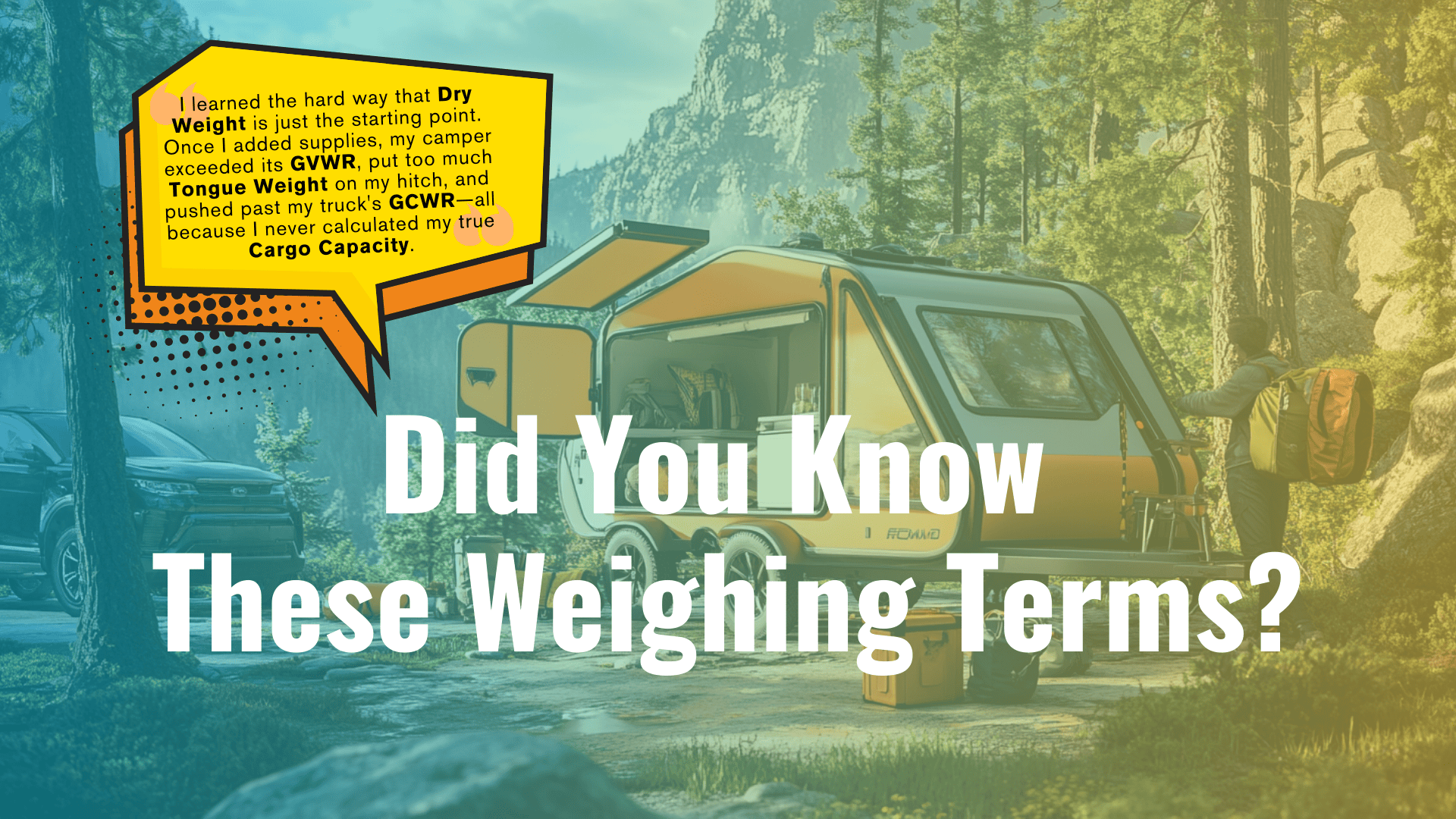
Understanding weight terminology helps you make smarter choices when shopping for a small camper. Many buyers focus only on the number listed as “weight” without realizing there are several different measurements that matter.
The base weight (often called UVW or dry weight) only tells part of the story. This figure represents what the camper weighs when it leaves the factory—empty, with no water, gear, or supplies.
Essential Terminologies
Below is a breakdown of the key terms you’ll encounter when researching camper weights:
- Dry Weight (UVW): The empty weight from the factory. This is your starting point before adding any personal items, water, or supplies.
- GVWR (Gross Vehicle Weight Rating): The maximum allowed total weight, including the camper and everything you load into it. Never exceed this limit for safety reasons.
- Cargo Capacity: How much weight can you add to the camper? Calculated by subtracting dry weight from GVWR, this determines what you can bring along.
- Tongue Weight: The downward force applied to your vehicle’s hitch. Typically, 10-15% of the camper’s total weight, which significantly impacts vehicle handling.
- GCWR (Gross Combined Weight Rating): The maximum allowed weight for your vehicle and camper together, including passengers and cargo in both.
These terms appear on specification sheets and are crucial for making proper comparisons between different models and brands.
When comparing campers, look beyond the basic weight number. A camper with a 2,000-pound dry weight might have a 3,500-pound GVWR, meaning you can add 1,500 pounds of gear, water, and supplies.
Remember that water weighs about 8 pounds per gallon. A 30-gallon fresh water tank adds 240 pounds when full! This alone can significantly change how your setup handles on the road.
Factors That Affect the Weight of a Small Camper
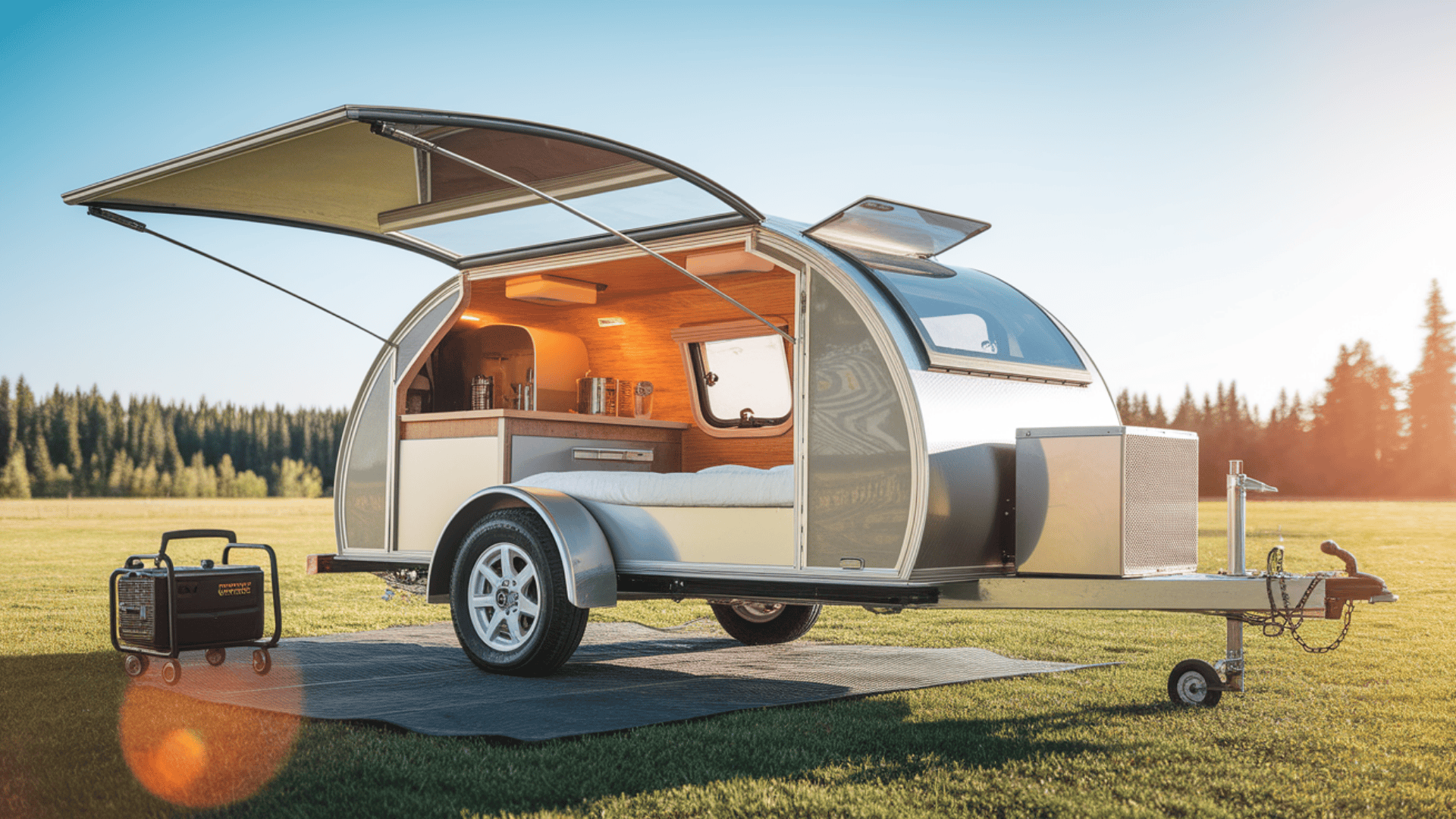
The materials used in construction make a tremendous difference in overall weight. Aluminum-framed campers typically weigh less than those built with traditional wood frames, though they often cost more upfront.
This weight-to-cost tradeoff represents one of the key decisions manufacturers make when designing small campers. Modern campers use various construction methods, each with its own weight implications.
Fiberglass shells create a seamless exterior that’s relatively lightweight and resists water damage. Steel frames offer strength but add considerable weight.
Some premium models use composite materials that combine strength with lighter weight, though these technological advances often come with higher price tags.
Construction Elements
Frame materials, wall thickness, and insulation all contribute to the base weight. Premium insulation might add pounds, but it saves on heating and cooling needs.
Everything inside adds up, too. Consider how these common features impact the overall weight:
- Kitchen appliances: 50-200 pounds
- Bathroom fixtures: 80-150 pounds
- Built-in furniture: 100-400 pounds
These components are essential to comfort but can significantly increase what you’re towing down the highway.
Water systems are often overlooked when calculating weight. A basic setup includes fresh water, gray water, and black water tanks plus a water heater, potentially adding 300+ pounds when filled.
Optional Features That Add Weight
The comfort upgrades that make camping more enjoyable also make your camper heavier. Slide-outs can add 600-800 pounds to the base weight. Solar panels and batteries for off-grid power might add another 100-200 pounds.
Even seemingly small additions matter. Mounting a bike rack? That’s 30-50 pounds before you add bikes. Planning to bring a portable generator? Add another 50-100 pounds.
Real-World Examples of Lightweight Campers by Type

Small campers come in various designs, each with advantages depending on your travel style. Some prioritize sleeping space while others focus on kitchen facilities.
Teardrops offer cozy sleeping quarters with minimal weight impact. Most models range from 1,500-3,000 pounds, making them towable by many SUVs. The NuCamp TAB 320 weighs just 2,290 pounds while providing a compact kitchen and wet bath.
Pop-up campers offer more living space without the weight penalty. When folded for travel, they also create less wind resistance. The Forest River Rockwood Premier weighs only 2,130 pounds yet sleeps six people when expanded.
For those wanting rigid walls without excess weight, A-frame campers offer a good compromise. The Aliner Scout weighs 1,850 pounds and sets up in about 30 seconds, providing standing room inside despite its compact towing profile.
If you need more amenities, compact travel trailers under 20 feet balance comfort and manageable weight. Casita Spirit models weigh around 2,800 pounds and include bathroom facilities with impressive durability.
Weight Comparison of Popular Models
Here’s how some of the most popular lightweight models compare across different categories:
| MODEL | TYPE | DRY WEIGHT | SLEEPS | KEY FEATURES |
|---|---|---|---|---|
| Jayco Hummingbird 10RK | Teardrop | 1,570 lbs | 2 | Outdoor kitchen |
| Coachmen Clipper 806XLS | Pop-up | 1,365 lbs | 4 | King bed, dinette |
| Aliner Expedition | A-frame | 1,850 lbs | 3 | Toilet, hard sides |
| Scamp 13′ | Travel Trailer | 1,700 lbs | 4 | Full bathroom option |
| Lance 1475 | Travel Trailer | 2,600 lbs | 4 | Slide-out dinette |
This comparison shows the wide range of options available while still staying under the 3,000-pound mark that many mid-size SUVs can handle.
How to Accurately Weigh Your Camper
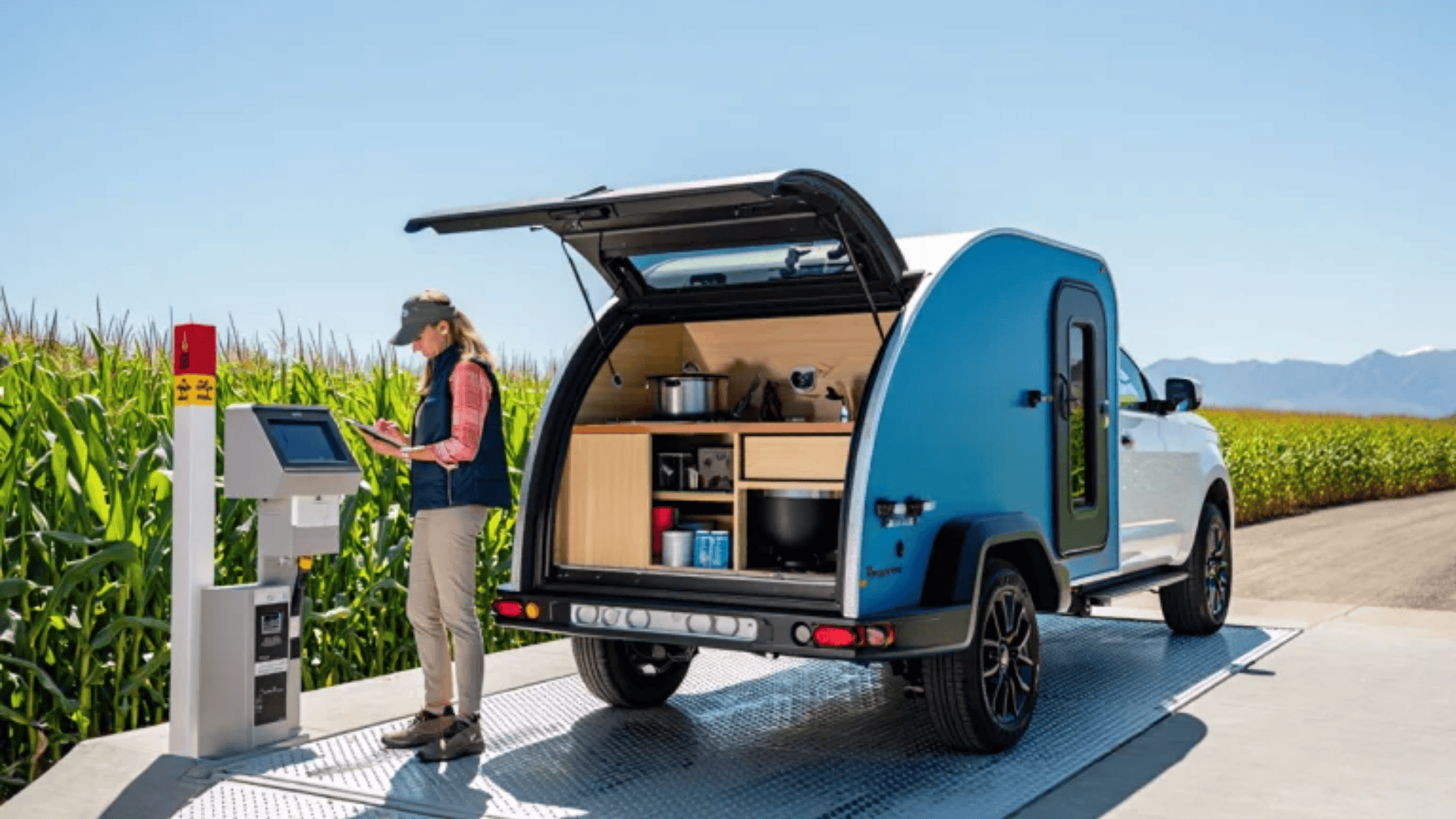
Don’t rely solely on manufacturer specifications. Actual weights often differ from published numbers due to manufacturing variations and aftermarket additions.
Many camper owners are surprised to discover their “lightweight” model weighs significantly more than advertised.
John, a first-time camper owner from Colorado, learned this lesson the hard way:
“I trusted the brochure’s weight and nearly burned out my transmission on my first mountain trip. Getting an accurate weight measurement saved me from buying a new vehicle.”
Finding a Scale Near You
The most reliable method is to use a certified scale. Many truck stops offer this service for $10-15. You’ll want to weigh your camper both empty and loaded to understand your true numbers.
Not sure where to find a scale? Try these options:
- CAT Scale locations at major truck stops
- County landfills often have certified scales
- Agricultural feed stores in rural areas
- Moving truck rental facilities
- Some RV dealerships offer weighing services for customers
Call ahead to confirm availability and any fees. Most locations charge between $10 and $20 per weighing.
Step-by-Step Weighing Process
For the most accurate results, follow this process:
- Weigh your tow vehicle alone first
- Connect your camper and weigh the combined setup
- Subtract to find your actual camper weight
- Repeat after loading your gear for a real-world figure
This step-by-step approach gives you the most accurate picture of what you’re actually towing down the road.
Take notes during this process or use your phone to record readings. You might be surprised how much weight your “essentials” add. Many campers find they’re carrying 500+ pounds of items they rarely use!
Weight Tracking Tool
Consider creating a simple weight log for your camper:
| Date | Empty Weight | Loaded Weight | Notes |
|---|---|---|---|
| 5/15 | 2,850 lbs | 3,780 lbs | Before trip gear |
| 5/22 | 2,850 lbs | 3,340 lbs | After removing unused items |
This ongoing record helps identify weight creep over time and shows the impact of your packing choices.
Remember, knowing your camper’s weight isn’t just about following rules—it’s about ensuring your safety on the road and protecting your investment in both your vehicle and camper.
Taking the time to get accurate measurements might be the most important 30 minutes you spend before your next camping adventure. Have you weighed your camper recently? Many owners are surprised to discover they’re carrying hundreds of pounds of items they never use.
Tips to Stay Underweight and Tow Smart
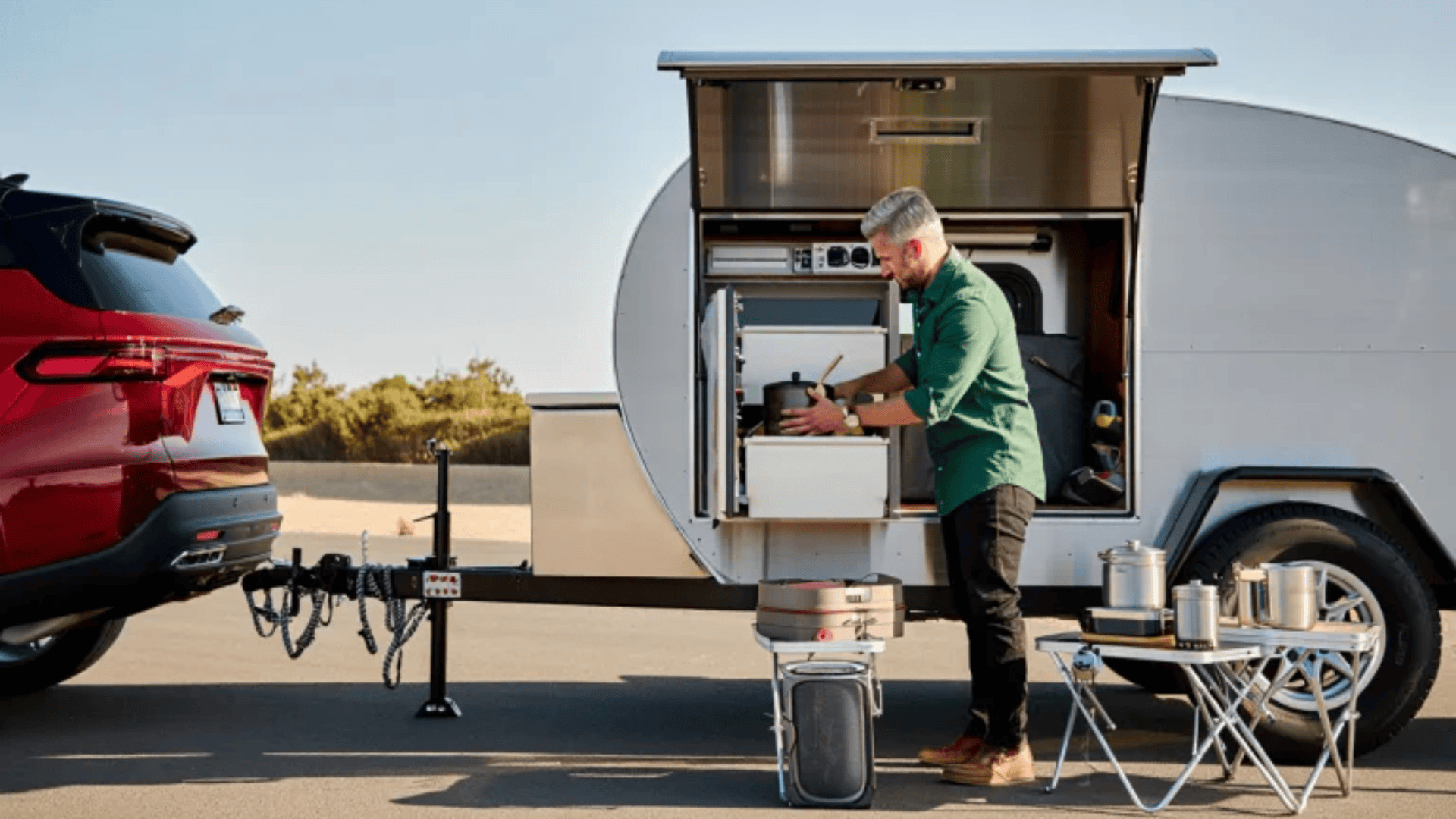
Smart packing makes a huge difference in how your camper handles on the road. Many experienced campers follow the 80% rule—never loading more than 80% of maximum capacity to maintain a safety buffer.
Here are practical ways to keep your weight in check:
- Store heavy items low and centered for stability
- Remove items you haven’t used in the last three trips
- Keep spare parts minimal—most can be purchased if needed
- Use lightweight alternatives for kitchen tools and dishes
These small changes add up to significant weight savings while maintaining comfort. A proper weight distribution hitch isn’t just an accessory—it’s essential safety equipment for most setups.
These systems help transfer weight properly between your vehicle’s axles, improving steering control and braking performance.
Remember that even the perfect small camper becomes dangerous when improperly loaded or towed beyond your vehicle’s capacity.
Taking time to understand weight limits and pack accordingly makes your camping trips safer and more enjoyable.
Final Thoughts
Small campers bring big adventures without requiring massive vehicles or special driving skills. Their weights vary dramatically—from ultralight teardrops at 1,000 pounds to feature-rich mini travel trailers pushing 4,500 pounds.
Knowing your camper’s true loaded weight keeps you safe, legal, and stress-free on the road. Remember to weigh your setup regularly, especially after adding gear or modifications.
Pack thoughtfully, focusing on what truly enhances your experience rather than what might come in handy someday. The perfect small camper balances comfort with practical weight limitations.
With the right match between vehicle and camper, you’ll spend less time worrying about towing capacity and more time enjoying those sunset views from your perfect campsite.
Come back for more helpful travel tips, gear recommendations, and campsite reviews.

